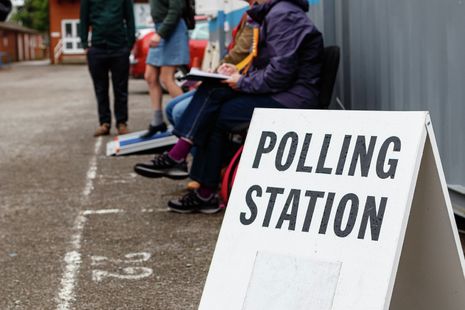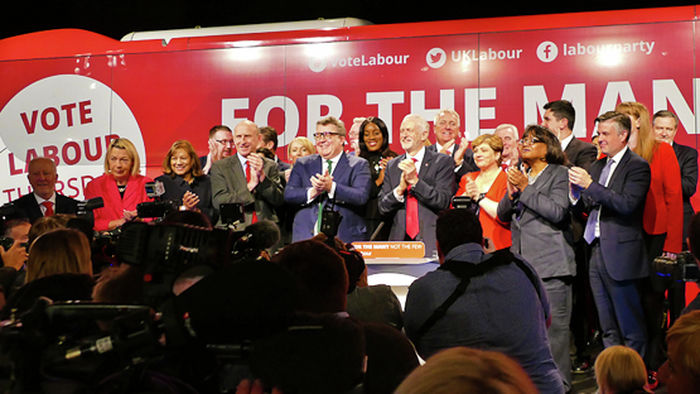Electability doesn’t require a return to Blair, but it rules out another Corbyn
Labour Party members Hollie Wright and Arran Parry-Davies argue that vulnerable people need the Labour Party to win much more than they need it to adhere to an ideology.

For the Labour Party to make a difference, it must first be the party of government. It must make itself a viable, attractive alternative to the Conservatives, who are likely to embark on the most extreme campaign of attacks on the most vulnerable in society. “Returning to Blair,” as some have decried the party is in danger of, will not do this, but neither will sticking with Corbyn.
New Labour has more faults than there is space to list, and this article will not attempt to rehabilitate its politics. But the point remains: Blair won, and from 1997-2010, life for working-class people in the UK was better, with the biggest NHS funding, minimum wage, and Sure Start.
Did he go far enough? Definitely not. But, frankly, only privileged members of the British left – in abundance in Cambridge – can sincerely say that an ideologically ‘impure’ Labour government is inferior to an opposition with the ‘correct-line’.
“The Corbyn project – although ultimately a failure – reinvigorated a party which was too often scared of questioning corrosive Neoliberalism.”
When Labour loses, Corbyn’s privately-educated advisors are fine. It is those at the bottom of society – the homeless, nurses using food banks, and children without a hot meal – that lose alongside it. Having seen both our parents struggling on Universal Credit, we cannot afford no-stakes purism, or a party run in its pursuit.
Admittedly, many argue that this election shows a clear mandate for a return to the centre. Luckily for Labour socialists, however, we don’t need a new Blair. In fact, Jo Swinson’s abysmal performance in 2019 proves that lifeless centrism has no mandate. The leadership candidates seem to agree: thus far, only Jess Phillips appears to be endorsing a swing to Blairism. But just as much as we don’t want a new Blair, we also don’t want a new Corbyn.
Having both voted Jeremy Corbyn for leader, we acknowledge how necessary he was for the party to move forward. In 2015, we stood as an out-of-date party stuck in a rut with no inspiration. The Corbyn project – although ultimately a failure – reinvigorated a party which was too often scared of questioning corrosive Neoliberalism. However, it has grown stale. Now seen as part of the ‘establishment’, the Corbyn programme is incapable of regaining the underdog spirit of 2017.
Any Labour member who campaigned this election knows that Jeremy Corbyn was the central topic on the doorstep. Unfavourable media coverage paired with an awful record on anti-Semitism, the perceived IRA association, and ostensible anti-patriotism were deeply unpopular with the electorate. When faced with this reality, the immediate response can be to cry ‘media lies’. True or not, it misses a bigger point: Labour will always have a battle with the press, and Corbyn was not fit for that battle.
British media has been historically hostile towards Labour, but we cannot blame them for all of our faults. Rating Corbyn ’ten out of ten’ and refusing to acknowledge the abysmally-run campaign will hand us the same crushing defeat over and over. Choosing the Corbyn ‘continuity’ candidate sends out a tone-deaf image of the party, and will not only deepen the already gaping rift between party factions but also reinforce the notion that we cannot listen to the public’s concerns. We’d be telling the electorate, ’it’s your fault we lost, not ours’.
Fundamentally, we will suffer the exact same pitfalls of a tired, tainted, and disunited Labour if we do not make a clean break from Corbynism. Labour is not the party of Jeremy Corbyn, as he himself said, “there is no such thing as Corbynism, there is socialism.” Indeed, the dismissal of Angela Rayner from some on the basis that she is ’not a Corbynite’ is the exact purist factionalism and ‘correct-line’ obsession that was detrimental to our public image. On the contrary, Rayner encapsulates Labour’s best; a left-winger with strong principles and the ability to tackle the press head-on, demonstrated by her high popularity ratings.
Lisa Nandy was correct to outline some of the ways that Corbynite Labour found itself deeply out-of-touch with the issues of the working-class: “nationalising trains is all good, but many areas of the country have no trains and rely on buses anyway.” Upon asking a member of the public on election eve how many Labour policies he knew, he responded with “free broadband, stopping Brexit,” which demonstrates how awfully we prioritised our agenda. Rebecca Long-Bailey’s surface-level analysis and tired union nostalgia is simply an extension of this archaic conception of the working-class. ‘Remember Thatcher!’ lost its appeal years ago, and despite its necessity, we can count on one finger the amount of times the ‘very popular’ Green New Deal came up in our weeks of canvassing.
Labour require a leader who is popular through the media, not despite it, and distances themselves from backwards-looking factionalism – someone who will break the ties with a stigmatised Corbynite past. This does not and should not mean reversing the radical and popular economic policies that propelled us in 2017 – but means applying these to a campaigning technique that listens and prioritises the things that matter most to people.
Like it or not, Jeremy Corbyn is now a part of Labour’s history, not its future. We can either learn from the mistakes made during his time as leader, or we can continue to make those mistakes and consign ourselves to further defeat for the foreseeable future. For the sake of those who need a Labour government, it’s our duty to listen.
 News / Caius mourns its tree-mendous loss23 December 2025
News / Caius mourns its tree-mendous loss23 December 2025 News / Clare Hall spent over £500k opposing busway 24 December 2025
News / Clare Hall spent over £500k opposing busway 24 December 2025 Comment / Yes, I’m brown – but I have more important things to say22 December 2025
Comment / Yes, I’m brown – but I have more important things to say22 December 2025 Interviews / Politics, your own way: Tilly Middlehurst on speaking out21 December 2025
Interviews / Politics, your own way: Tilly Middlehurst on speaking out21 December 2025 News / King appoints Peterhouse chaplain to Westminster Abbey22 December 2025
News / King appoints Peterhouse chaplain to Westminster Abbey22 December 2025









